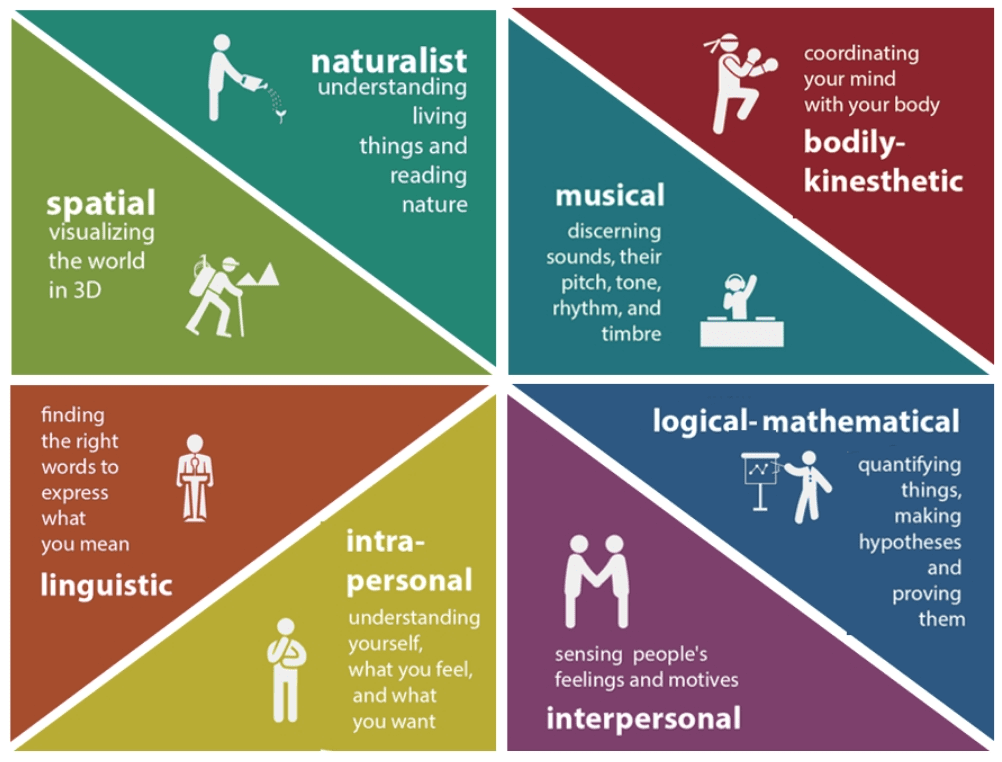Are you intelligent?
The answer to that might be more complicated than you think. Many people can say “yes” and they can say “no” at the same time!
Why? Because there isn’t just one way to be intelligent. Some, like Harvard psychologist Howard Gardner, say that there are nine types of intelligence. His work is a response to earlier theories of intelligence, that suggested that there was just one type of general intelligence.

What Are The Nine Types of Intelligence?
- Visual-spatial intelligence
- Linguistic-verbal intelligence
- Mathematical intelligence
- Kinesthetic intelligence
- Musical intelligence
- Interpersonal intelligence
- Intrapersonal intelligence
- Naturalistic intelligence
- Existential intelligence
Visual-spatial intelligence
Visual-spatial intelligence is the ability to create, understand, or process visual information. If you’ve ever met someone who can look at a blueprint and design a whole room, you can guess that they have high visual-spatial intelligence.
Here’s an example of when this comes in handy. You get a new nightstand - but you have to assemble it. When you open up the assembly instructions, you don’t see any words. Just pictures! If you have high visual-spatial intelligence, this won’t be a problem. You’ll still be able to put together that nightstand.
Linguistic-verbal intelligence
If you have high linguistic-verbal intelligence, those instructions probably wouldn’t get you too far. A person with high linguistic-verbal intelligence has the innate ability to understand and use verbal and written languages. This person would do much better with a set of written instructions to assemble their nightstand, even if those instructions didn’t have any pictures.
Mathematical intelligence
Mathematical intelligence is more than just the ability to work with numbers. This intelligence is also known as “logical intelligence.” People with this type of intelligence can see connections between different moving parts. They are able to use reasoning and logic to investigate an idea. They are also able to work with more abstract ideas that aren’t necessarily put on paper.
So what if there were no instructions on how to build this nightstand? What if you just had a set of parts and the tools to put the nightstand together? Someone with mathematical intelligence may be able to put these parts together. They might even brainstorm some ways that each part of the nightstand could be used more effectively!
Kinesthetic intelligence
Not all problems are solved by looking at a page or listening to instructions. Someone with kinesthetic intelligence has the ability to learn by doing. They are often very skilled in moving their body, including working with their hands. Athletes and tradesmen are likely to have high kinesthetic intelligence.
A person with high kinesthetic intelligence might have a hard time building a nightstand with pictures or written instructions. But if they can have someone who knows how to build the nightstand beside them, they can learn by doing.
Musical intelligence
Musical intelligence is the ability to understand and produce music. I’m not just talking about being able to play the piano. A person with high musical intelligence can listen to a song and know what key it’s in. They can hear a note and tell if it’s flat or sharp. They can harmonize with what’s playing on the radio with ease.
As we move into the next few types of intelligence, I want to think a bit out of the box. Sure, a person with high musical intelligence probably also has other types of intelligence that will help them build that nightstand. But they will also excel more in other tasks. Maybe they put together a playlist to keep friends focused as they build nightstands. Maybe they can help write a jingle for the nightstand company to sell more products. Not all tasks appeal to one type of intelligence.
Interpersonal intelligence
Interpersonal intelligence is the ability to work with others. People with these abilities can negotiate, persuade, and empathize. They don’t have to know someone personally to understand how they are feeling or see their perspective.
If a person with high interpersonal intelligence didn’t want to build a nightstand, they could easily convince someone to do it for them. They could also sell the nightstand with ease!
Intrapersonal intelligence
Intrapersonal intelligence is the ability to understand oneself. Rather than empathizing with others, a person with high intrapersonal intelligence can tap into their own feelings with ease and understand their motivations. It is easy for this person to make achievable goals, take breaks when they need to, and manage their feelings.
Where does the nightstand fit in here? Well, a person with intrapersonal intelligence may be able to assess whether they can build this nightstand in the first place. They know their skills and they know if they have the time or capacity to get this (and other) projects done. If they know that this project will just frustrate them or be a waste of time, they will find another solution and go about their day.
Naturalistic intelligence
Naturalistic intelligence doesn’t involve the human world at all. A person with this intelligence has the ability to understand and interact with the natural world. They feel comfortable with plants, animals, and the relationship between these beings and humans.
Like musical intelligence, naturalistic intelligence doesn’t really apply to building a nightstand. But someone with this type of intelligence is more likely to be aware of the materials used to build the nightstand. They might have a lot of plants ready to put on the nightstand once it is built. This person may rely on other types of intelligence to build the nightstand, but once the task is over, they can go back to more interesting tasks and projects.

Existential intelligence
This final type of intelligence was added to Gardner’s list years after he published his original theory. Existential intelligence is the ability to dig deeper and contemplate the human condition. A person with this type of intelligence uses metacognition or inner wisdom to contemplate life’s big questions. Again, a person with this type of intelligence may rely on other skills to build a nightstand. Their skills are better suited as a religious leader, philosopher, or other profession that wants to put together “the big picture.”
Take Advantage of Your Intelligence
Gardner says that “there is now a massive amount of evidence from all realms of science that unless individuals take a very active role in what it is that they're studying, unless they learn to ask questions, to do things hands-on, to essentially recreate things in their own mind and then transform them as is needed, the ideas just disappear.” If you want to truly learn something, it’s not enough to sit in a classroom and let a professor’s lecture go in one ear and out the other. You need to harness your intelligence to learn the things you want to learn. Your approach may look different from your classmate’s, your parent’s, or your friend’s. But that’s okay. What matters is that you continue learning and growing, even if it’s in a rather unique way.



